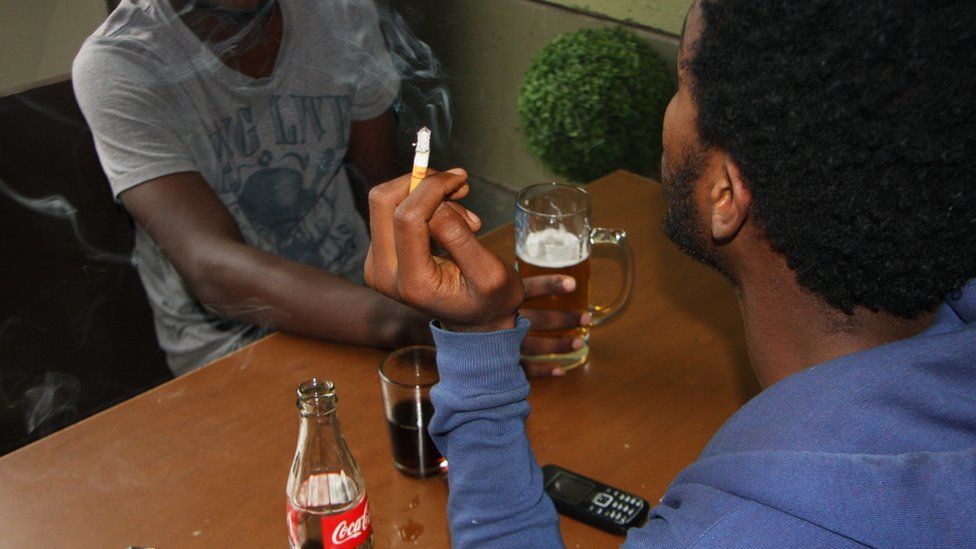Can Ethiopia's 'secret smokers' stub out their cigarettes?
- Published

A lone dancer weaves arabesque shapes with the red tip of his cigarette to the rhythm of loud Amharic music in a dark closeted bar in Ethiopia's capital - oblivious to a recent ban on smoking in public places.
The night-time corners of Addis Ababa have long allowed revellers in a deeply conservative society to embrace activities that might otherwise be frowned upon - including smoking cigarettes.
Cigarettes remain deeply divisive in Ethiopian culture and Addis Ababa smokers well into their 20s will not tell disapproving parents of their habit.
"It is the health implications, money, everything - they worry you will get addicted," says 23-year-old Haile, who like other smokers interviewed did not want to give his second name.
Smoking at home is not an option - so Haile and his contemporaries tend to turn to the dive bars in the old city's Piazza, the dark alleys off the main thoroughfare of Bole Road and the red-light district of Chechnya to light up.
Mohammed, 27-year-old smoker in Addis Ababa:
"Non-smokers will be happy, but I am uncomfortable with not being able to do what I want - it is taking away a bit of my freedom"
"I am not sure what we will do if smoking is banned everywhere," says 25-year-old Mikael, who sat with friends smoking around a table in a beer garden off Bole Road.
Mohammed, 27, who sits smoking opposite Mikael, was more circumspect.
"Non-smokers will be happy, but I am uncomfortable with not being able to do what I want - it is taking away a bit of my freedom."
However, implementing the ban in Addis Ababa, a rambunctious city that has grown to about five million people, has not proved a simple task.
A manager of one Piazza bar has felt no pressure to impose a policy that would be unpopular with his 20-something clientele: "We watched news about the ban on television and so expected it to be enforced around here, but nothing has happened - day and night you can smoke here, inside and outside."
Imported habit
In newer upmarket nightclubs, more health-conscious customers are often glad to see smoking eliminated.
Amare Reda, Addis Ababa bar owner:
"Customers going to higher end places tend to be more health conscious than customers in cheaper places, many of whom still do not understand the problem of passive smoking"
"I spent 20 years in Sweden and saw how it could work," says Amare Reda, who implemented a smoking ban in his large stylish nightclub, Stockholm Elegance, when it opened in 2014.
"Customers going to higher-end places tend to be more health conscious than customers in cheaper places, many of whom still do not understand the problem of passive smoking."
In 2004, the Ethiopian government - keen to be seen as a team player internationally, especially on populist global issues such as climate change and poverty reduction - signed the World Health Organization Framework Convention on Tobacco Control.
A decade later, it ratified the international convention, entering it into Ethiopian law books - and early in 2015 Mekelle, in Ethiopia's northern Tigray region, became the first city to implement the ban.
By the end of September last year, no-smoking signs in Amharic and English started appearing on walls and windows of Addis Ababa hotels, bars and cafes.
Ethiopia has never had a significant smoking problem compared with much of the world, though smoking invariably has health, social, economic and environmental consequences for the country.
About 7.9% of Ethiopia's urban population and 5.5% of those in rural areas - where most people live - were smokers in 2011, according to figures from the country's Food, Medicine and Health Care Administration and Control Authority (FMHACA).
"The numbers seem small, but that is why it is better to take action now," says FMHACA's Asnakech Alemu. "Once they are bigger it will be harder to control."
Ethiopia's first cigarette factory was built in the early 20th Century, primarily to cater for the habits of Italian soldiers around the country's eastern borders.
During Emperor Haile Selassie's reign, as the country continued to open to the West, imported Peugeot cars with inbuilt ashtrays encouraged smoking among wealthier Ethiopians.
Saving smokers money
Beyond health repercussions of smoking, the ban aims to alleviate the smoking habits of breadwinners, to help low-income Ethiopian households, says FMHACA's Baharu Zewdie.
For many Ethiopians - a 20 Ethiopian birr ($1, £0.70) pack of locally made Nyala cigarettes are prohibitively expensive, as a construction worker would earn 50 birr a day. In response, street stalls sell single cigarettes.
According to the terms of the convention, Ethiopia has until 2020 to implement the ban country-wide.
An indigenous form of smoking similar to the shisha pipes or hookahs smoked in the Middle East is especially popular in southern Ethiopia.
Smokers inhale through a mouthpiece attached to a large pot, or gourd, in which tobacco burns on charcoal or cow dung.
Mr Baharu says smoking is most popular in eastern parts of Ethiopia, where a cigarette is often smoked by those chewing khat leaves.
It is an addictive stimulant, which is chewed for hours usually by men sitting in groups.
They have yet to face the smoking ban, but the authorities hope it will have been fully implemented in the capital within a year.
It is not all doom and gloom for Addis Ababa's smokers as smoking will be allowed on public premises in designated ventilated rooms, or outside for those over 18 years old.
And some are now taking the law seriously - with some murky drinking dens having these designated smoking rooms, while at others smokers obediently sit on stools outside.
For Mohammed, however, these new rules are not going to change his life style.
"Though maybe I will stop when I have kids," he says.
- Published2 January
- Published28 January 2012
- Published6 February 2016